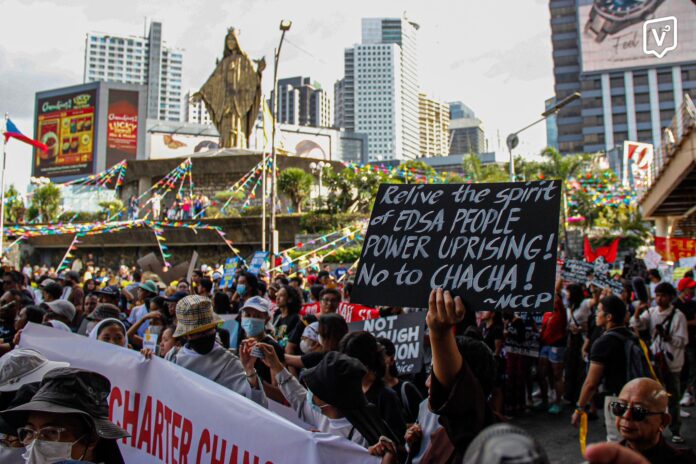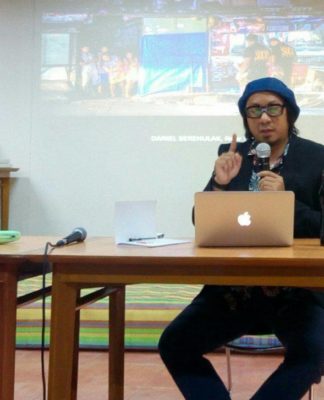
THE EDSA People Power Revolution, which restored democracy and brought an end to the two-decade Marcos dictatorship, should be remembered by Filipinos as lawmakers seek to amend the 1987 Constitution that was born out of the historic event, a former congressman said.
Former Akbayan Partylist representative Tom Villarin said that despite efforts to diminish the significance of the EDSA People Power Revolution, the 1987 Constitution should remain a reminder of the spirit of the nearly bloodless revolt.
“Every move to amend the Charter or the Constitution always brings us back to EDSA,” he told the Varsitarian. “In a way, [these efforts] are a reminder that EDSA should not be lost in our consciousness, should not be lost in our history.“
“The 1987 Constitution is a stark reminder that democracy is not something that should be given up by our people, that human rights are integral to human dignity, integral to the dignity of our nation.”
The momentum to amend the 1987 Philippine Constitution is building up as the EDSA revolt approaches its 40th anniversary. This year, President Ferdinand “Bongbong” Marcos Jr., son of the late dictator, excluded the 38th anniversary of the revolution from the list of nationwide holidays for 2024.
Marcos Jr. has thrown his support behind the efforts to amend the 1987 Constitution. However, he said that only economic provisions should be revised in the charter and “nothing more.”
Asst. Prof. Froilan Calilung, who teaches political science at the University, pointed out an irony in the situation, noting that the 1987 Constitution was crafted in response to the abuses of the Marcos regime, and yet, there is now a push for Charter change (cha-cha) during the time of another Marcos.
“Kasi, yung pihit ng EDSA [was] against the Marcosian dictatorship. Ngayon, ang pihit ng charter change is in favor of the Marcos administration,” Calilung said.
Calilung said integrity, patriotism, and accountability should guide lawmakers as they proceed with the “cha-cha.”
“If ever we are going to be imbued with this power and the authority and the function and the role to change the Constitution, it must be well within the context of the love for the country,” the political science professor told the Varsitarian.
Calilung said some of the provisions of the 1987 Constitution were crafted in “retaliation and reaction” to the dictatorial rule of the older Marcos. Part of this was giving back Congress its check-and-balance powers to prevent the executive branch from hogging all government authority.
In January, the pro-charter change group People’s Initiative for Modernization and Reform Action (PIRMA) made its push public through a paid TV advertisement titled “EDSA-Pwera,” a play on the avenue name and the word etsapuwera, which means to toss something away or push it to the side.
“Sa 1987 Constitution, natigil ang asenso natin…Ang pinayaman ng Konstitusyon, mamamakyaw at negosyante,” the advertisement claimed.
Villarin said that while the advertisement’s call for cha-cha was “legitimate,” its reasons were “quite a bit overstretched.”
“It did not reflect what happened in our history during the 1986 revolution. It was not reflective of why people then revolted against the dictatorship,” Villarin told the Varsitarian.
“EDSA revolution was a nationwide revolution. Saying that only a portion of the populace, in a way, supported the EDSA revolution is, again, not true because it was a culmination of people’s distrust against the Marcos dictatorship,” he added.
House Speaker Martin Romualdez, a cousin of the president, led the push for constitutional amendments in the lower chamber. In March 2023, the House of Representatives approved a resolution on third and final reading, calling for a constitutional convention to amend some economic provisions of the current charter.
Both Marcos Jr. and Romualdez had assured the public that the latest cha-cha attempt would only deal with the economic provisions of the charter, which restrict foreign ownership in public utilities, education, advertising, and other key sectors.
Controversy surrounding the cha-cha began earlier this year when a signature campaign was initiated to amend the Constitution through the People’s Initiative. Allegations arose that the campaign was offering payment in exchange for signatures.
RELATED STORY: CBCP cautions against latest cha-cha attempt
Villarin, however, said there was no “real, genuine push coming from the people.”
“The question, really, is what are the motivations for such goal? Why do political groups, interest groups want to amend the Constitution? History would say that many of the reasons why they want to amend the Constitution are all about short-term gains, like the extension of terms for politicians,” the former congressman said.
“They have been saying that now they’re using this People’s Initiative, but obviously, this People’s Initiative [is] being backed now by politicians,” he added.
The Commission on Elections, which is responsible for receiving and counting signatures for the People’s Initiative campaign, has decided to halt all proceedings related to the cha-cha push.
Piecemeal approach?
One of the framers of the 1987 Constitution, Bernardo Villegas, recognized that the charter was a “highly imperfect document” that was penned in a “highly emotional state” by those part of the Constitutional Commission.
“Many of the provisions that found their way to the final draft of the Constitution were written in a highly emotional state by individuals who were suffering from the general trauma of the Filipino people as a result of the tumultuous last years of the dictatorship under President Ferdinand Marcos [Sr.] which culminated in the EDSA Revolution of 1986,” Villegas wrote in his article “Do We Need Charter Change Now?”
“To be frank, the 1987 Constitution—though written with the good intentions of being pro-Filipino—turned out to be an anti-Marcos or anti-martial law document,” he continued.
But even though the current Constitution is “very imperfect,” Villegas said it should not be amended in parts like what Marcos Jr. planned.
“I am not in favor of a piecemeal approach to the amendment process. The fundamental law of the land is an organic document and all the provisions must fit into one consistent whole,” he said.
“A piecemeal approach may only worsen one of its major weaknesses, which is that some provisions are not compatible with one another,” he added. Mabel Anne B. Cardinez with reports from Hannah Joyce V. Andaya, Fernando Pierre Marcel B. Dela Cruz, and Mikhail S. Orozco















